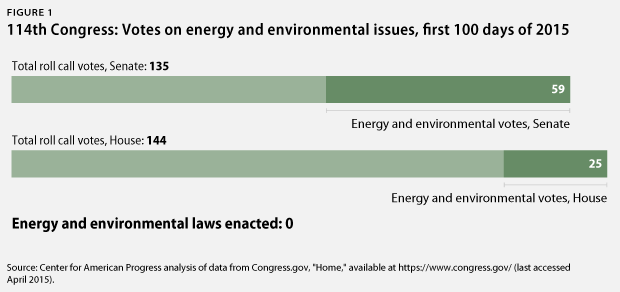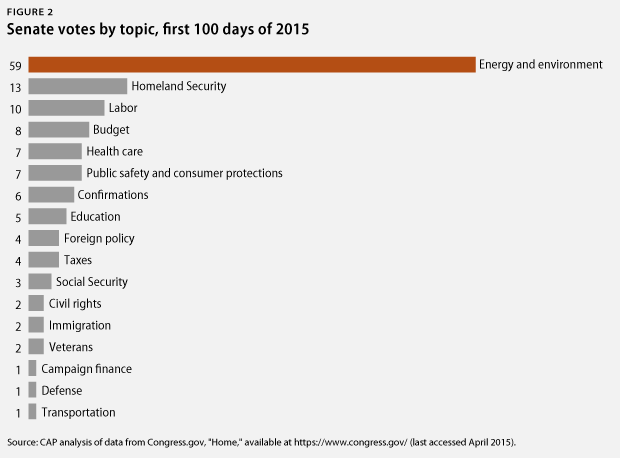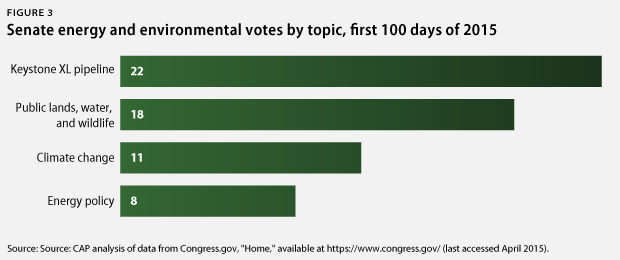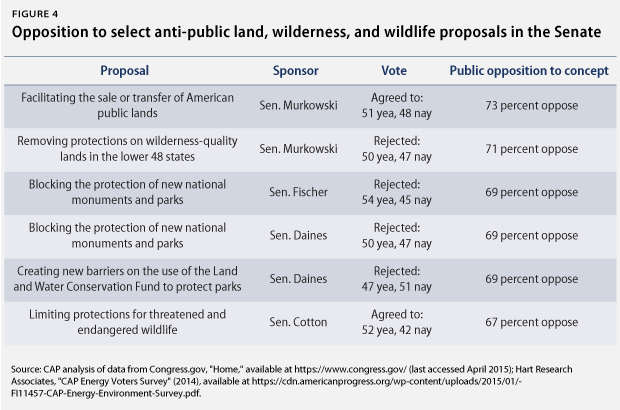In the first 100 days of 2015, the new Congress has cast more roll call votes on energy and environmental issues than on any other legislative area, with the Senate casting 44 percent of its votes on the Keystone XL tar sands pipeline; efforts to block action to reduce carbon pollution; proposals to sell America’s public lands; and other fossil-fuel and energy-related legislation. However, not one of the energy- or environment-related bills and amendments on which the new Congress has voted has become law.

Whereas congressional leaders often aim to achieve signature legislative achievements during their first 100 days, the energy and anti-environmental agenda of the 114th Congress has come off the rails before leaving the station. The Senate and House devoted weeks of debate to the Keystone XL tar sands pipeline, knowing full well that President Barack Obama would veto the legislation if it were sent to his desk. Moreover, rather than advancing and voting on the stated energy priorities of the new congressional leadership, a Center for American Progress analysis of roll call votes shows that this Congress has instead focused on divisive anti-environmental proposals that, according to public opinion research conducted by Hart Research Associates for CAP in December, the American public widely opposes.
House and Senate roll call votes
The 114th Congress has cast a total of 279 roll call votes, more than 30 percent of which were on energy- and environment-related topics. In the House, more than 17 percent of votes focused on energy and environmental issues, the lion’s share of which was aimed at blocking efforts to address climate change. In the Senate, 59 roll call votes were on energy and environmental issues, well ahead of the number of votes dedicated to economic, health care, and national security issues combined.

The high number of votes cast on the Keystone XL tar sands pipeline—8 in the House and 22 in the Senate—is consistent with now-Senate Majority Leader Mitch McConnell’s (R-KY) December pledge to put the controversial pipeline at the top of the agenda for the new Congress. Yet the Senate has also cast dozens of votes on other energy and environmental issues, including 18 roll call votes on whether to preserve or weaken protections for public lands, wildlife, and clean water. In fact, the Senate has cast more votes—five—to remove protections of wilderness areas, block new parks, and sell public lands than it has votes—four—to address defense, veterans, and transportation issues combined.

CAP’s analysis found that on 74 percent of the energy and environmental votes since the start of the new Congress, a majority of senators supported the anti-environment position. On 8 of the 11 votes related to climate change, a majority of senators supported the anti-environment position. Following Sen. McConnell’s vow “to do any and everything I can to stop” the Environmental Protection Agency’s, or EPA’s, efforts to cut carbon pollution, 49 senators—all Republicans—voted to deny that “climate change is real” and that “human activity significantly contributes to climate change.” A majority of senators also voted to block President Obama’s agreement with China to cut greenhouse gas emissions, though the proposed amendment did not receive the 60 votes required for passage.
A Senate agenda that is off the rails
In 2013 and 2014, coal, oil, and gas companies spent more than $720 million to help ensure that a new Congress would advance an agenda focused on fossil fuels. That investment paid off in a big way, with the November midterm elections sweeping in conservative majorities in both houses. The incoming chair of the Senate Energy and Natural Resources Committee, Sen. Lisa Murkowski (R-AK), pledged to prioritize a wishlist of fossil-fuel industry priorities, including fast-tracking U.S. oil and natural gas exports, approving the Keystone XL pipeline, and opening new areas for offshore drilling.
Although Sen. Murkowski has begun to hold committee hearings on some of the priorities she outlined in a 2013 policy paper and in January comments, she has endured setbacks and is experiencing slow progress in at least three key areas. The first of these areas is oil exports. In January 2014, Sen. Murkowski delivered a high-profile speech that called for the lifting of oil export restrictions, but since taking over the chairmanship of the Energy and Natural Resources Committee, she has taken a self-described “methodical” approach to the issue. An amendment to lift oil export restrictions was pulled from the floor in January out of concern that it did not have enough votes to pass.
The second area is natural gas exports. Sen. Murkowski’s committee held a hearing in January on the subject, but a proposal by Sen. Ted Cruz (R-TX) to expedite liquefied natural gas exports failed to reach the 60 votes needed to pass. The third area deals with allowing oil and gas development in new areas. Neither Sen. Murkowski’s committee nor the full Senate has voted on legislative proposals to open new federal lands offshore or onshore to oil and gas development. The oil and gas industry claims that this is one of its top priorities, notwithstanding the fact that energy companies are sitting idle on 21.9 million leased acres of federal lands onshore and 26.9 million leased acres of federal waters on the Outer Continental Shelf.
With the exception of the Keystone XL tar sands pipeline and failed attempts to block the Obama administration’s efforts to cut carbon pollution, Senate leadership has dedicated little time and few resources to advancing its top-tier energy priorities. Instead, a review of Senate hearings and floor activity reveals that Sen. Murkowski and other Senate leaders have gotten sidetracked by a series of highly partisan and divisive anti-environmental legislative proposals. News accounts have documented Sen. Murkowski’s outrage at the Obama administration’s protection of the Arctic National Wildlife Refuge and the Izembek National Wildlife Refuge in Alaska, including threats to cut the Department of the Interior’s budget and force layoffs of park rangers in retaliation against the administration. Sen. Murkowski subsequently brought amendments to a vote in the Senate that would release wilderness-quality lands in the lower 48 states from wilderness protection and facilitate the sale or transfer of public lands to private or state ownership. The December public opinion research shows that the concepts reflected in Sen. Murkowski’s amendments against public lands, along with other anti-wildlife and anti-public land amendments brought to a vote on the Senate floor, are unpopular with voters of all parties.

Leadership needed
With the failure of the new Congress to enact any of its top energy priorities in its first 100 days, congressional leaders will now have to decide how to get their energy and environment agenda back on track. Continuing to focus on dismantling protections for public lands, clean air and water, and wildlife appears to be a deeply unpopular and losing strategy, particularly in the Senate. Meanwhile, the big-ticket priorities of the fossil-fuel industry—including expanding oil exports, blocking the EPA from cutting carbon pollution, and expanding onshore and offshore drilling—have thus far not acquired the momentum or political support needed to pass.
Congressional leaders will need to forge an alternate path of consensus building and bipartisanship if they hope to achieve meaningful legislative results. Expanding renewable energy production, for example, is a top priority for both Republican and Democratic voters, according to the December public opinion research. Likewise, a broad bipartisan majority supports new protections for parks, wilderness, and public lands. The new Congress would be wise to reset its direction on energy and environmental issues and to tie its agenda to the priorities expressed by the majority of the public rather than those of the fossil-fuel industry.
Note: Authors’ analysis of roll call votes is based on a review of records collected by the clerk of the House and the Senate bill clerk and compiled by the Library of Congress. The information is available on the Library of Congress website at Congress.gov.
Matt Lee-Ashley is a Senior Fellow and the Director of Public Lands at the Center for American Progress. Claire Moser is a Research and Advocacy Associate with the Public Lands Project at the Center. Emily Ludwigsen, an intern at the Center, contributed to this analysis.